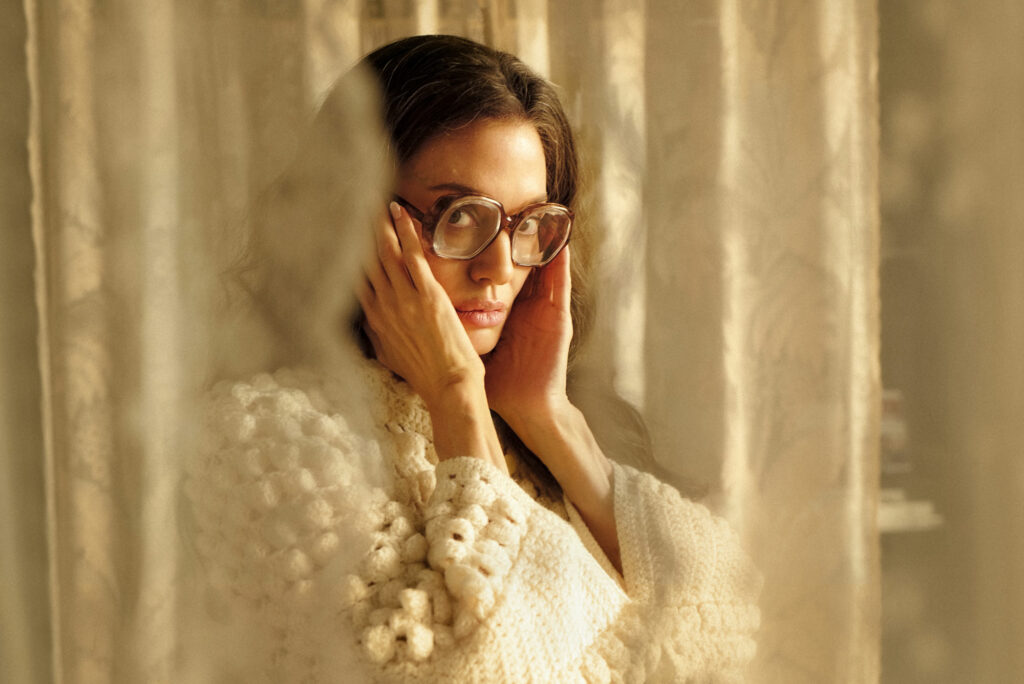Words by JANE CROWTHER
Pablo Larraín’s latest portrait of a woman struggling under a media lens (completing the triptych with Jackie and Spencer) is his most linear and conventional approach to teasing out the pain, trauma and self doubt intrinsic to being a famous female figure in the 20th century – but it’s also his most emotionally resonant. That’s perhaps because Angelina Jolie, as opera diva Maria Callas, brings her own life experience of press obsession to the role in a performance that will certainly be in the awards conversation.

Written by Spencer scribe Steven Knight, Maria follows a 53-year-old Callas in the last week of her life in 1977 Paris, wrestling her artistic and romantic demons as her diet-ravaged body fails. An imperious, self-confessed ‘tiger’ who has weathered scandal (her affair with Aristotle Onassis), and criticism (from her mother and the media), Callas pops pills and sees visions from her life as her faithful butler (Pierfrancesco Favino) and housekeeper (Alba Rohrwacher) watch on. Split into four distinct acts, Callas explores the guilt, shame, pride, triumph and sadness that has coloured her career from being a shy girl in Athens singing for German officers for cash to the feted beauty ‘La Callas’ who has lost her magnificent voice. Hooked on sedatives, Maria invites a film crew into her life to document her last interview led by Kodi Smit-McPhee (pulling double duty at the Venice Film Festival on this and Disclaimer). ‘Is the film crew real?’ Maria’s butler asks doubtfully, gently, as he dutifully heaves her grand piano around her apartment on her daily whim. Maria is, at this stage, a glacial, imposing primadonna experiencing hallucinations who claims that ‘there is no life away from the stage’ yet tells a fan of the pain – both mental and physical – of performing. Taking her last bow, she crafts an emotional autobiography of sorts, a ‘human song’ of her life.
Knight carefully plots a path that allows opera buffs to enjoy parallels between Callas’ life and her roles while also informing the uninitiated of the key beats of the star’s career – taking in other famous faces including Onassis, Marilyn Monroe and JFK. In a pleasing full-circle moment with Jackie, Callas and Kennedy have a breakfast table conversation about love that elegantly illustrates the commodifying of famous women and Maria’s sharp wit that netted her a reputation as ‘difficult’.

Beautifully filmed and costumed, Maria is as operatic as any of the arias sung during the runtime and the supporting artists are a delight (Valeria Golino shines in a key moment as Callas’ sister who suggests that her sibling closes the door on the pain of letting music so destructively into her life), but the main event in every way is Jolie. The way she inhabits any space, moves with the elegance of a cat and talks in Callas’ precise, cool diction is mesmerising. And when she sings – the older Maria moments are mostly her own voice while the younger Callas is the diva’s real vocal – the emotion, drama and effort she brings to the music is genuinely impressive. Jolie trained for months to inhabit Callas and the results recall the lived-in performance of Cate Blanchett in Tar – a Volpi cup winner at the festival and gong magnet throughout the year. Jolie will likely be on the same trajectory.
Words by JANE CROWTHER
Maria is in cinemas now


